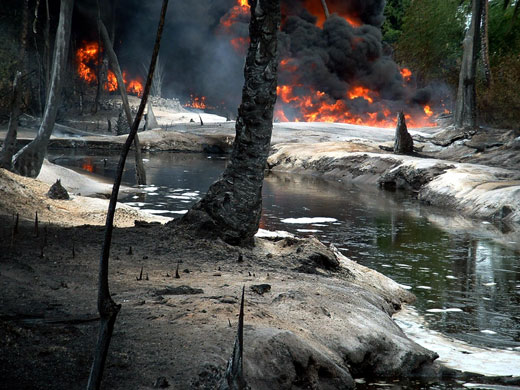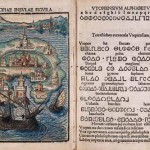Nigeria, at independence from British rule in 1960, was called the Giant of Africa. With a large population, an educated elite and many natural resources, especially oil, Nigeria was supposed to fly the flag of democratic success. It did not, and it is clear now, in retrospect, that it could not possibly have done so.
These were the initial comments made by Chimamanda Ngozi Adichie (London Review of Books, Things Left Unsaid, 11 October 2012) on the “unsaids” in the recently published memoir of the famous author Chinua Achebe, entitled “There was a Country”. This is an allegation which Adichie somewhat objects to, instead arguing that there was no Nigerian nation at the moment of its founding. Rather it was an “economic policy” for the British colonial rule to subsidize the poor North with resources from the wealthier South. This strategy failed according to Adichie:
A nation is, after all, merely an idea. Colonial policy did not succeed in propagating the idea of a nation: indeed, colonial policy did not try to. In the North colonialism entrenched the old elite; in the South it created a new elite, the Western-educated.
Adichie also notes that Achebe was lucky to be grown up among these old educated elites. And this may also have led him to his strong belief in the idea of Nigeria, and as such caused him to feel great disappointment about Nigeria’s course following the independence from British colonial rule. The main reason for Nigeria’s continued “backwardness” according to Achebe is owing to the Igbo tribes lack of integration with the rest of Nigeria, all the way from the scars of the Biafra War and onwards.
Although most of these so called “unsaids” is thoroughly drawn into attention by Adichie, my intention is nonetheless to point out some other “unsaids” which may still dwell in the predicaments of Nigerias so called “backwardness”, not mentioned by Adichie in this specific case.
To begin with, it is crucial to know that Achebe’s writings, in particular his book Things Fall Apart, is famously known as the act of “writing back” to the West in the process of decolonialization. By writing his own history, Achebe decisively challenged the reductionist writings on the peoples of Nigeria and its history conducted by the imperialist West. But even though independence was an absolute improvement, and the process of “writing back” an ineluctable empowerment; I would like to propose the idea that it may not simply be the case that Nigeria is effectively decolonialized after all.
Besides the tragedy of the Nigerian-Biafran War and the unsuccessful British “economic policy” of attempts to redistribute wealth from the South to the North of Nigeria, there may also be the case (in a global context) of Nigeria being part of a larger “economic policy” of redistributing from the poor southern parts of the world to the rich northern parts. In the Nigerian case, I think this work is most efficiently conducted by the oil company Shell.
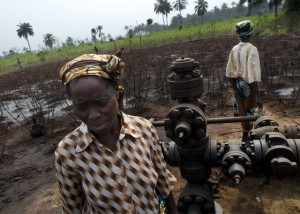 It is fait accompli that Shell, or the more properly so called “Shell Petroleum Development [sic!] Company” and its Nigerian joint-venture partners have earned billions of dollars from oil extracting in the Niger Delta from 1937 and onward. This area is populated by the Ogoni people which have been protesting the great costs imposed on them from the oil extraction for decades. According to a study by Richard Boele (Shell, Nigeria and the Ogoni, 2001), rather than development, they have experienced a detoriating environment, conflicts and different kinds of evictions and physical displacements from their livelihoods. The consequences of the oil extraction have been absolutely devastating. Leaving large parts of Niger Delta mangrove completely destroyed and waters so contaminated that no fish can live there. Shell has even left worn out industrial constructions and pipelines in the open terrain without lifting a finger for its dismantling.
It is fait accompli that Shell, or the more properly so called “Shell Petroleum Development [sic!] Company” and its Nigerian joint-venture partners have earned billions of dollars from oil extracting in the Niger Delta from 1937 and onward. This area is populated by the Ogoni people which have been protesting the great costs imposed on them from the oil extraction for decades. According to a study by Richard Boele (Shell, Nigeria and the Ogoni, 2001), rather than development, they have experienced a detoriating environment, conflicts and different kinds of evictions and physical displacements from their livelihoods. The consequences of the oil extraction have been absolutely devastating. Leaving large parts of Niger Delta mangrove completely destroyed and waters so contaminated that no fish can live there. Shell has even left worn out industrial constructions and pipelines in the open terrain without lifting a finger for its dismantling.
Even though the campaigns of protests have been mostly non-violent, Boele emphasizes that it nonetheless resulted in thousands of Ogoni being “killed, raped, beaten, detained and exiled and the main leaders executed.” That was for example the barren destiny of the famous and awarded activist Ken Saro-Wiwa which was executed in 1995. Shell had prior to his execution pulled out from Ogoniland owing to the social pressure put forward by the organization Movement for the Survival of the Ogoni People (MOSOP) which he represented.
Ken Saro-Wiw undertook the challenge as early as 1968 just when the effective seizure of Ogoniland by the Nigerian government was about to commence. He wrote:
We refuse to accept that the only responsibility which Shell-BP owes our nation is the spoliation of our lands [. . . ] We shall appeal to the Federal military government, or whatever government succeeds it to continue to show concern for small nationalities such as ours – especially in constitution making, that it TAKE STRONG COGNIZANCE OF OUR DESIRES WITH REGARD TO THE COMPANIES PROSPECTING OR OPERATING ON OUR SOIL (original emphasis, reproduced in Saro-Wiwa, 1995a).
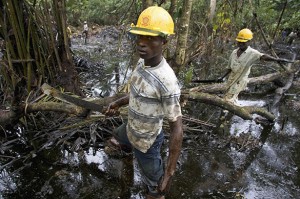 Today, Shell’s operations in Nigeria amounts to 14 percent of its global production, and 7 percent of its profits. That means Shell also produces half of Nigeria’s total daily production of two million barrels of crude oil. It should be stressed according to Boele that the Nigerian oil industry is nationalized since the 1970s, and that Shell have operated through joint-ventures with the Nigerian government. However, I would argue that this so called nationalization is rather insignificant when the entire state itself is actually under the control of Shell. This fact was confirmed earlier this spring when leaked diplomatic cables between the U.S. government and Shell revealed that Shell had inserted staff into all of the main ministries of the Nigerian government – giving it total control of every move made by Nigerian politicians.
Today, Shell’s operations in Nigeria amounts to 14 percent of its global production, and 7 percent of its profits. That means Shell also produces half of Nigeria’s total daily production of two million barrels of crude oil. It should be stressed according to Boele that the Nigerian oil industry is nationalized since the 1970s, and that Shell have operated through joint-ventures with the Nigerian government. However, I would argue that this so called nationalization is rather insignificant when the entire state itself is actually under the control of Shell. This fact was confirmed earlier this spring when leaked diplomatic cables between the U.S. government and Shell revealed that Shell had inserted staff into all of the main ministries of the Nigerian government – giving it total control of every move made by Nigerian politicians.
Shell claim its “by most effective contribution to Nigeria is through the taxes and royalties we pay [to the federal government]” (Shell International, 1995a). At the height of the conflict of the 1990s it even paid as much as 55 percent of revenues to the Federal government. This may sound like charity, but borne in mind with the fact that the Federal government guaranteed its business by military means and conducted seizure of lands, construction of necessary industrial infrastructure and so on; it should rather be looked upon as a means of outsourcing operations which would otherwise be on the costs of Shell either way. After all, funding for the amelioration of environmental problems that struck the Ogoni amounted to only but one single percent of the revenues. And instead of cleaning up the mess in the Niger Delta, Shell spent 16 million USD on an advertising campaign to clean up its image. The damage done to the Ogoniland was (and is) left untouched.
Shell now argues that it have improved its corporate social responsibility and now engages in community development partnerships, at the same time they move large parts of their operations offshore. However, according to the conclusions of a study conducted by Uwafiokun Idemudia (Oil Extraction and Poverty Reduction in the Niger Delta: A Critical Examination of Partnership Initiatives, 2008) there is:
no amount of road or bridge construction, provision of electricity or awarding of scholarships that can compensate for the loss of livelihood resulting from 5400 incidences of oil spills that have been officially recorded since 2000.
A similar conclusion is drawn by Ite Uwem. Although Shell has adopted CSR-policies, it has strangely enough protracted effective implementation. It might be argued that this is just a temporary malfunctioning, but once again there also seems to be a larger ominous context. Idemudia argues that even if local capacity for monitoring and enforcing of effective environmental regulation is strengthened, it makes no difference when the overall trend is that of governments of developing countries accelerating their slashing of environmental standards in order to attract investments. Evidently, that is how far the contribution of corporate social responsibility reaches in this case; it is like cleaning the floors of a sinking ship.
It should also be stressed that the Nigerian state is crippled by serious corruption. Boele refer to this corruption as one of the “challenges” facing Shell in its exploitation of Nigeria. Unfortunately, he does not elaborate too much on the root cause of this corruption.
Honest civil servants seem to be harder to find nowadays. For example, although Ken Saro-Wiwa died for Nigeria, his son Ken Saro-Wiwa Junior actually stated earlier this year that, unlike his father, he wanted to live for Nigeria. He emphasizes that many of his father’s minority rights demands are now met. However, a context also worth mentioning is his employment within the Nigerian government. This may partly explain the point he made on Nigerian television when he said that his past as an activist had to end when he “grew up” and realized that the “seat at the table” he raged over when he was young eventually stood vacant for him.
“There comes a point when, yes, okey, you have a voice. We have heard your voice. But what do you bring to the table?”
To the contrary, one who has not yet “grown up” in the sense of Saro-Wiwa Junior is the civil society leader and environmental activist Celestine AkpoBari. He spends his days continuing the work of Mr. Juniors legendary father. Protesting forced evictions of people living in oil-rich areas and also leads a campaign for the adoption of the Ogoni Bill of Rights. A document presented before the Nigerian government back in 1990 calling for:
political autonomy to participate in the affairs of the Republic as a distinct and separate unit (by whatever name called), provided that this autonomy guarantees political control of Ogoni affairs by Ogoni people; the right to control and use a fair proportion of Ogoni economic resources for Ogoni development; adequate representations, as of right, in all Nigerian national institutions, and the right to protect the Ogoni environment and ecology from further degradation. (MOSOP.org)
Returning to one of the initial topics, Celestine recently concurred with Achebe on the question of “there was a country.” On his twitter @GreatOgoni he wrote “I am agreeing with Prof Achebe that “there was a country” called Nigeria but not any more! Failed Rulers are now owners of electricity firms.”
It is a fair guess that this tweet is referring to the corruption and lack of corporate social responsibility among the multinationals in Nigeria. So, if Shell really takes its corporate social responsibility seriously; how about acknowledging the quite basic statutes of the Ogoni Bill of Rights instead of running so astonishingly charitable community development partnerships?
I think this is the so called obvious-stupid-question concerning the Nigerian predicament. For obvious reasons Shell would not prefer this to become reality. And this brings us back to the prefatory topic, that of colonialism.
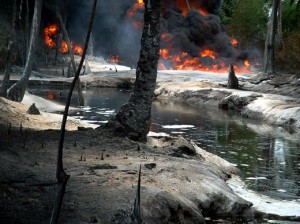 Instead of hoping for the will of adaptation from the part of Shell while enraging ourselves with the concept of classical colonialism I think we would have some great intellectual benefit to the cause of freedom of human beings if we rather left the essentialist view of the “West” as a fixed ethnic entity whose violence subjugated “Africa” or the “Third World” as an equally essentialist type of entity. And whose essence and “true identity” was an absolute and fixed being in history which was then distorted. It is true that the historically constructed entity we call the “West” colonialized the historically constructed entity called “Africa”. It is also true that the oppression of colonialism changed the course of history of this identity, but just as everything else, history is rather contingent. So we should not look upon these as inevitable fixed entities, but as contingent entities, that means: entities that can change.
Instead of hoping for the will of adaptation from the part of Shell while enraging ourselves with the concept of classical colonialism I think we would have some great intellectual benefit to the cause of freedom of human beings if we rather left the essentialist view of the “West” as a fixed ethnic entity whose violence subjugated “Africa” or the “Third World” as an equally essentialist type of entity. And whose essence and “true identity” was an absolute and fixed being in history which was then distorted. It is true that the historically constructed entity we call the “West” colonialized the historically constructed entity called “Africa”. It is also true that the oppression of colonialism changed the course of history of this identity, but just as everything else, history is rather contingent. So we should not look upon these as inevitable fixed entities, but as contingent entities, that means: entities that can change.
Therefore, returning to Achebe’s complaints about “there was a country…” Yes maybe it was a country. But just as Adichie emphasized, Nigeria – just as every nation-state – may also be nothing but an “economic policy”. And I think it is very doubtful that the people of Nigeria, and Ogoniland in particular, would have chosen this particular policy.
Consequently, we might as well say that there will absolutely not be any change before the people decide for themselves. As long as they do not decide for themselves, they are still effectively colonialized. And last of all. As long as we as the citizens of the so called “democratic West” cannot do anything about it – we may suspect that we are too.
Text: Dennis Halvordsson
Photos: Nairaland Forum

